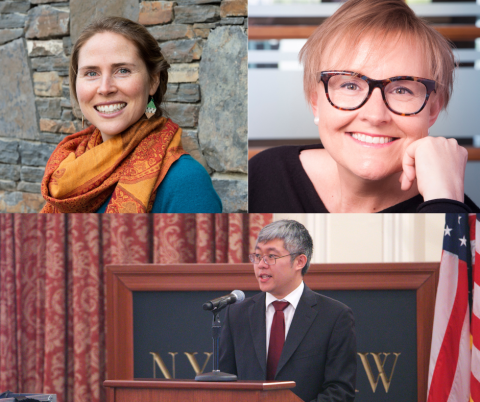
Students have begun taking classes taught by two new faculty members and one with a new faculty appointment. Professors Alvin Cheung and Debra Haak, PhD’19, both active scholars who bring a wealth of practical experience into the classroom, have each started two-year teaching appointments. Professor Lindsay Borrows, an expert in Indigenous law and legal traditions, joined the school on July 1.
Professor Alvin Cheung, who holds a JSD from New York University and recently completed a SSHRC Post-Doctoral Fellowship at McGill, specializes in the relationship between law and authoritarianism. His work focuses on how laws that are not necessarily illiberal or anti-democratic on their face can be used to pursue illiberal or anti-democratic objectives. This research interest stems in part from his time in practice as a barrister in Hong Kong. His article on “Legal Gaslighting” was recently published in the University of Toronto Law Journal. His work reaches across the domains of human rights, comparative law, and the rule of law to consider how our commitment to legality is challenged by the rise of autocratic and authoritarian regimes. He taught Law and Public Affairs at Hong Kong Baptist University and, in 2020, he taught Statutory Interpretation at Queen’s Law.
“I look forward to teaching Public Law to the incoming 1L cohort this term, and to teaching Administrative Law and leading the Law & Autocracy seminar next term,” he says.
Professor Debra Haak, who earned her PhD in Law at Queen’s, focuses her research on how the law contends with interests, rights, and values in tension. She is particularly interested in how courts address those tensions in constitutional challenges to laws enacted in areas of highly contested public policy. Her doctoral thesis, The Wicked Problem of Prostitution and Sex Work Policy in Canada, considered the debate over Canada’s current prostitution policy and criminal prostitution laws as a conflict between and among stakeholders prioritizing different and at times divergent interests – a topic for which she has been interviewed by national media outlets. For her 2020 research project on how the Charter contends with women’s individual and group rights when they do or appear to conflict, she was awarded the Queen’s Research Opportunities Fund Postdoctoral Fellowship. Previously at Queen’s, she taught Criminal Law, Insolvency Restructuring, and Introduction to Legal Skills and she received the Society of Graduate and Professional Students’ John G. Freeman Faculty Excellence Award in 2019. Her research has been published in the UBC Law Review, the Windsor Review of Legal and Social Issues, the Queen’s Law Journal, and the Alberta Law Review, and was recently cited by the Ontario Court of Justice. Until 2016, she was a partner at Gowling WLG, where she practised commercial and insolvency litigation and appeared regularly before all levels of court in Ontario.
“The students in my Criminal Law courses are given the opportunity to think critically about the use and operation of criminal laws in contemporary Canadian society,” she says. “Students in both my Criminal and Constitutional Law courses this year will consider how the constitution constrains criminal lawmaking, with a focus on important contemporary topics, including the commercial exchange of sex, medical assistance in dying, and extreme intoxication.”
Professor Lindsay Borrows, a PhD candidate and LLM graduate of the University of Alberta, researches and teaches special topics in the field of Indigenous law. Previously, she worked as a lawyer and researcher with the Indigenous Law Research Unit (University of Victoria Faculty of Law), and as a staff lawyer with West Coast Environmental Law. In both positions she provided legal support to Indigenous communities and organizations engaged in the revitalization of their own laws for application in contemporary contexts. She has worked on community-engaged projects with different legal traditions, including Anishinaabe, Denezhu, Haíɫzaqv, Nlaka’pamux, nuučaan̓uł, St’át’imc, Syilx, and Tsilhqot’in. She is particularly passionate about the possibilities within land-based legal education, and since 2014 she has co-facilitated various ‘on-the-land’, community-engaged Anishinaabe Law Camps in partnership with different law schools and communities across Ontario. Her book, Otter’s Journey Through Indigenous Language and Law (UBC Press, 2018), explores the connections between language and law. Borrows is Anishinaabe and a member of the Chippewas of Nawash First Nation. For more information, read the Queen’s Law story announcing Professor Borrows’ appointment.
“This fall I’m looking forward to introducing students to the field of Indigenous law, in particular the ways various communities across the country are revitalizing their legal traditions. To explore these themes, we will work with Indigenous (primarily Anishinaabe) stories, ceremonies, language, land-based practices and learn from community voices.”